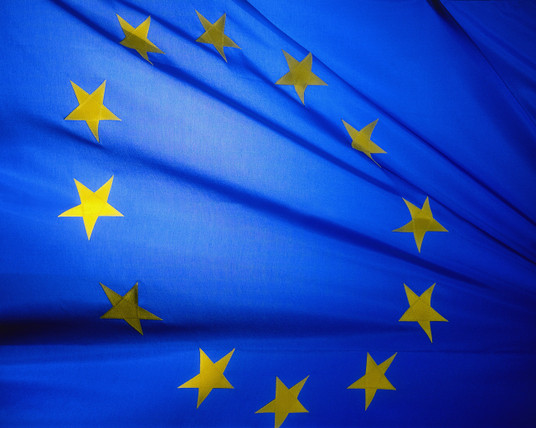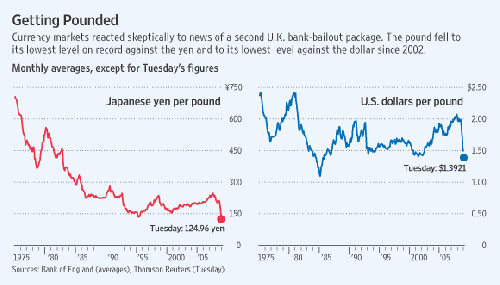
With news understandably focused on the inauguration this weekend, I’ve compiled a roundup of recent transatlantic economic developments that may have been overlooked.
UK
The banking sector is in crisis after Brown unveiled a fresh bailout package. Rather than boosting confidence, the new plan seems to have scared investors by highlighting the true extent of Britain’s recession. Combined with packages introduced in late 2008, UK bank bailouts and stimulus measures now total £500 billion, or $691.4 billion, according to the latest XE exchange rates. The pound subsequently hit a seven-year low against the dollar and an all-time low against the yen:
 |
| GBP-JPY and GBP-USD Exchange Rates (WSJ) |
Ironically, Natsuko Waki at Reuters Blogs found a quote that Brown might now prefer not to repeat; the then-Chancellor said in 1997: “A weak currency arises from a weak economy which in turn is the result of a weak government.” The currency tumble comes amid news that unemployment in the UK reached its highest level since 1997, hitting 1.92 million by the end of November of last year. This is almost 300,000 more people than at the same time in 2007.
France
French officials are considering a €6 billion ($7.8 billion) capital injection for the auto industry, which employs nearly 10 percent of the country’s workforce. More at the Independent.
Germany
The German government predicted that the country’s economy will shrink by 2.25 percent in 2009, Deutsche Welle reported. If these projections are realized, this would be the German economy’s worst performance since the end of World War II. Such a drop represents a large decline from the 1.3 percent growth expected for 2008 and the 2.5 percent growth seen in 2007.
Figures for 2008 from a report by Economics Minister Michael Glos and Finance Minister Peer Steinbrueck are also expected to show an increase in unemployment of 500,000, bringing total joblessness to 3.5 million, or 8.4 percent. This news follows the announcement last week that Germany’s major parties have agreed to a second economic stimulus package worth €50 billion ($64.5 billion).
Peter Cassata is associate editor of the Atlantic Council.
Image: STOCK%20-%20EU.jpg
